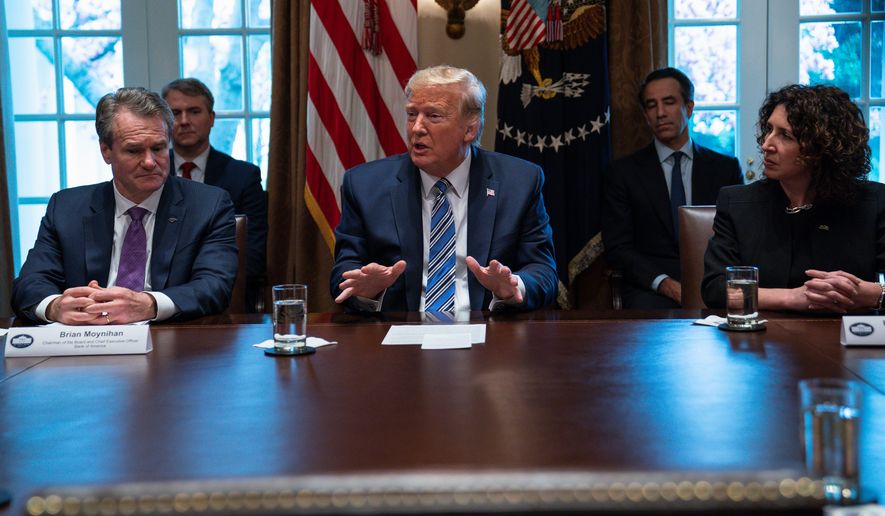Stocks nose-dived again Wednesday on concerns about the growing economic harm from the coronavirus outbreak, while the White House and House Democrats crafted separate fiscal rescue plans including extensions for small business tax payments, free virus testing and paid sick leave.
President Trump met with bankers and Wall Street executives at the White House while markets plummeted, and all the people around the table in the Cabinet Room attested to the health of the U.S. financial system.
“We’re going to get the problem solved,” Mr. Trump said. “The country is so strong, the institutions are so strong.”
Michael Corbat, CEO of Citi, said banks are in good shape to help their customers through any economic downturn.
“This is not a financial crisis,” Mr. Corbat said. “The banks and the financial system are in sound shape, and we are here to help. The good news is that the markets have performed in an orderly way.”
It was an orderly march straight downhill for investors Wednesday. The Dow Jones Industrial Average dropped 1,465 points, or 5.9%, to close at 23,553.
The S&P 500 lost 4.9%, while the Nasdaq plummeted 4.7%. The sell-off erased Tuesday’s gains, which had followed losses of more than 7% Monday.
The losses put the indexes in bear market territory, meaning they have dropped at least 20% from their highs, reached in mid-February.
Treasury Secretary Steven T. Mnuchin and House Speaker Nancy Pelosi spoke twice on Wednesday about steps to protect the economy and to slow the spread of the virus. House Democrats said they will vote on a measure Thursday, but it won’t include Mr. Trump’s call for a cut in payroll taxes through the end of the year.
“Democrats are not in favor of it. I’m trying to figure out why,” Mr. Trump said.
“Someone needs to tell the Democrats in Congress that CoronaVirus doesn’t care what party you are in. We need to protect ALL Americans!” he tweeted.
The House bill was still being written Wednesday night, but Democrats’ top priorities are making coronavirus tests free, shoring up unemployment insurance, and giving workers paid sick leave.
Additionally, they want to address food security for vulnerable communities, especially school children without access to meal plans if their schools are closed, and senior citizens prompted to stay in isolation.
“We’re looking at a range of issues that are the economic consequences as opposed to health direct health consequences,” said House Majority Leader Steny H. Hoyer, Maryland Democrat.
Mr. Mnuchin said the administration is considering an extension of the April 15 tax-payment deadline for certain individuals and small businesses, saying the move could boost the amount of cash available in the economy.
“We think we can provide over $200 billion of liquidity into the economy by delaying certain tax payments,” he said in a House Appropriations subcommittee hearing.
Mr. Mnuchin said a top administration priority is to provide funding for small- and medium-sized businesses directly affected by the outbreak.
“There are a large number of workers that are going to be required to self-quarantine, or be at home to take care of family members who are self-quarantined,” he said. “For small- and medium-sized business, we think it’s appropriate for the government to pick up those costs.”
He also said the administration is looking to “dramatically” increase lending from the Small Business Administration, which would need congressional authorization.
The administration likely will provide other “targeted assistance” for businesses such as cruise lines hurt by the outbreak.
“This is not bailouts,” Mr. Mnuchin said. “We are not looking for bailouts. But there may be specific industries that are highly impacted by travel, that have issues with lending, and just like after Sept. 11, the government authorized certain loan guarantees. We may consider that.”
Mr. Trump “very much wants to consider a stimulus bill, whether it’s through a payroll tax [cut] or otherwise,” Mr. Mnuchin said.
• Dave Boyer can be reached at dboyer@washingtontimes.com.
• Gabriella Muñoz can be reached at gmunoz@washingtontimes.com.




Please read our comment policy before commenting.